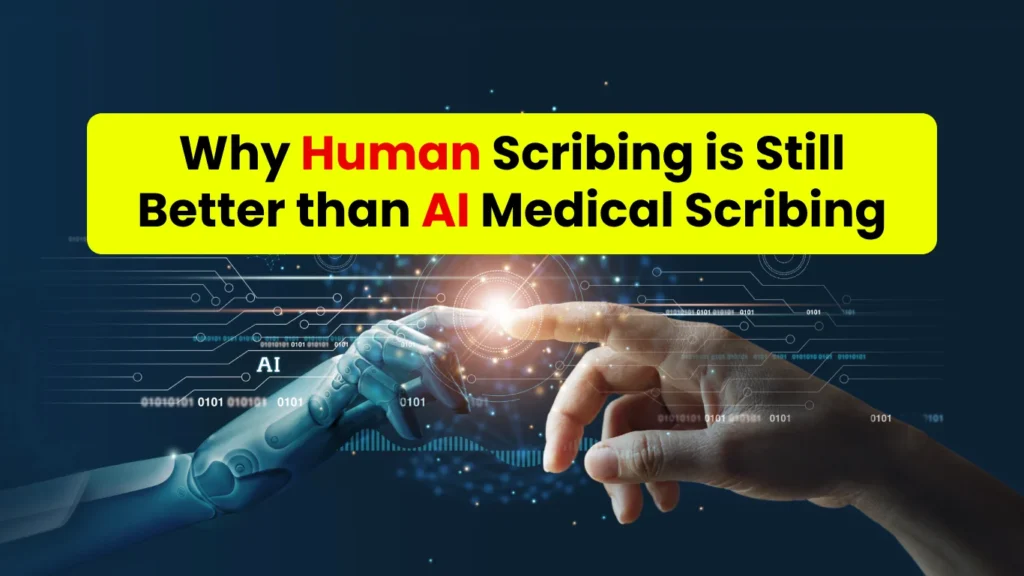Home » Why Human Scribing is Still Better Than AI Medical Scribing
Why Human Scribing is Still Better Than AI Medical Scribing
- BLOGGED BY SIRAS KHAN P (Content Writer) -
- Aug 12 2024 -
- 06 MINS READ

Table of Contents
Why Human Scribing is Still Better Than AI Medical Scribing
In the fast-paced healthcare environment of today, efficiency and patient experience are very important. Medical scribes have long been essential in reducing the administrative tasks of doctors, allowing them to focus more on patient care.
With the coming of AI-powered medical scribes, some might wonder if these technologies can replace human scribes. While there are certain advantages offered by AI scribes, human scribes still provide unparalleled support in many crucial areas.
The Challenges of AI Medical Scribing
Faulty Notes
AI systems rely on natural language processing (NLP) to transcribe conversations. However, they sometimes struggle to distinguish between casual conversation and critical medical information. For instance, a patient’s comment about the weather or likability of things might seem irrelevant to an AI, but it could be crucial if the patient has weather-related joint pain. Human scribes, on the other hand, can accurately judge the relevance of such information.
Inconsistent Time Savings
AI promises to save time, but the reality is often different. Doctors may spend additional time reviewing and correcting AI-generated notes, leading to frustration and inefficiency. With human scribes, doctors can trust that the notes are accurate, reducing the need for time-consuming revisions.
Outdated Medical Terminology
AI systems require constant updates to stay current with evolving medical terminology. Unfortunately, maintaining these databases is not as simple as hitting a refresh button. Human scribes, who receive regular training, are more adept at keeping up with the latest medical language.
Delay in Billing Process
naccurate AI-generated notes can lead to billing delays, as errors must be corrected before submission to insurance companies. This can result in significant administrative overhead and delayed payments. Human scribes help ensure that notes are accurate and complete, reducing the risk of billing issues.
Prior Authorisation Issues
AI scribes can struggle with the detailed and accurate documentation needed for prior authorisation with insurance companies. Human scribes, with their ability to accurately capture and contextually understand patient interactions, minimise the chances of delays caused by incomplete or inaccurate documentation.
The Advantages of Human Scribing
Personalised Approach to Assessment Details
Every patient is unique, and their medical records should reflect that. Human scribes can accurately capture the nuances of a patient’s visit, ensuring that all relevant information is documented. This personalised approach improves the quality of care and supports better patient outcomes.
Real-Time Scribing with Flexibility
Human scribes work in real-time, up close and personal, allowing doctors to focus entirely on patient care without worrying about documentation. They adapt to the physician’s schedule, providing consistent support whether the need is full-time or part-time.
No Dictation Required
Unlike AI scribes, which require doctors to dictate notes, human scribes can capture information directly from the doctor-patient conversation. This saves time and ensures that the doctor’s attention remains on the patient, not on administrative tasks.
Patient Privacy and HIPAA Compliance
Human scribes are trained to comply with HIPAA regulations, ensuring that patient data is handled securely and with care. They can be present in consultations, providing accurate and contextually relevant documentation while maintaining patient privacy.
Medical Scribing Course at Anton's MediCode
Duration: 6 months
Mode of class: Online and Offline
Qualification: Plus two and above
What’s Included?
- Demo classes for all new joiners
- Placement assistance in alliance with 150+ MNCs and hospitals.
- Provides interview-oriented and personality development soft skill training.
- Renders campus-recruitment facilities.
- Internship opportunities with best hospitals
Why Anton’s Medicode?
- AAPC Approved Institution.
- Economical Fee Structure
- Placement Assistance with Top MNC’s
- Get Placed in Various Healthcare Related Jobs
- Well-equipped Lab with Audio Facilities
- Trained Faculties with Certifications ISO 9001:2015 Certification
- 100% Placement Assistance
- 8% CPC Clearing Records
- 200+ Placement Partners
- 65% Satisfaction Rate
Conclusion
As we can see, while AI-powered medical scribes offer some benefits, the human touch remains irreplaceable. Human scribes provide accurate, personalized documentation, reduce administrative overhead, and improve overall efficiency.
At Anton’s MediCode, we are creating highly trained medical scribes who support physicians in delivering the best possible patient care.
Contact us today to learn more about our medical scribing course.
Join the Best Medical Scribing Course in Kerala at Anton’s MediCode and get a successful career in Hospital Medical Scribing .
Our Courses
- Medical Coding
- Medical Transcription
- Medical Scribing
- Hospital Administration
- Antonsmedicode
- No #1 Medical Coding And Scribing Institute In Kerala
